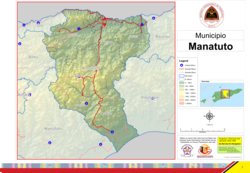You can help expand this article with text translated from the corresponding article in German. (July 2011) Click [show] for important translation instructions.
|
Manatuto (Portuguese: Município Manatuto, Tetum: Munisípiu Manatutu) is one of the municipalities (formerly districts) of East Timor, located in the central part of the country. It has a population of 45,541 (Census 2010) and an area of 1,783.3 km2. The capital of the municipality is also named Manatuto. It is the least populated municipality of East Timor.
Manatuto | |
|---|---|
| |
 Cliffs at Manatuto | |
 | |
| Coordinates: 8°42′S 125°55′E / 8.700°S 125.917°E | |
| Country | |
| Capital | Manatuto |
| Administrative posts | |
| Area | |
• Total | 1,783.3 km2 (688.5 sq mi) |
| • Rank | 2nd |
| Population (2015 census) | |
• Total | 46,619 |
| • Rank | 13th |
| • Density | 26/km2 (68/sq mi) |
| • Rank | 13th |
| Households (2015 census) | |
| • Total | 7,467 |
| • Rank | 12th |
| Time zone | UTC+09:00 (TLT) |
| ISO 3166 code | TL-MT |
| HDI (2017) | 0.614[1] medium · 5th |
| Website | Manatuto Municipality |
Etymology
editThe word Manatuto has been said to be a Portuguese approximation of the local Tetum and Galoli language word Manatutu, which means 'pecking birds'.[2]
According to another source, the word is a portmanteau of the Tetum words Mana and tutu, which mean 'old woman' and 'peak' or 'summit', respectively. The legend goes that two groups of people were each living on the summit of a hill, one of them named Sau Raha (now Soraha) and the other Sau Lor (now Saulidun). The two groups were engaged separately in their own daily activities, but each was accompanied by one of two Liurai, who were brothers.[3]
Geography
editThe borders of the municipality of Manatuto are identical to those of the council of Portuguese Timor with the same name.
The municipality borders the municipalities of Baucau and Viqueque to the east and Manufahi, Aileu, and Dili to the west. It reaches both the south and north coasts of the island, and is only one of two municipalities to do so (the other is Lautém in the far east), and has the most geographical diversity. To the north is the Strait of Wetar, to the south is the Timor Sea.
Administrative posts
editThe municipality's administrative posts (formerly sub-districts) are:[4][5]
- Barique-Natarbora (pop. 4,900)
- Laclo (pop. 6,400)
- Laclubar (pop. 10,100)
- Laleia (pop. 3,200)
- Manatuto (pop. 11,500)
- Soibada (pop. 2,950)
The administrative posts are divided into 29 sucos ("villages") in total.
Demographics
editIn addition to the official languages of East Timor (Tetum and Portuguese), a large part of the population of the municipality speaks the Malayo-Polynesian language Galoli, which is designated as a "national language" by the constitution.
Notable people
editThe municipality is known as the birthplace of Xanana Gusmão, later to become the nation's first president. He was born in the village of Laleia (19 km East of Manatuto town).
References
editNotes
edit- ^ "Sub-national HDI - Area Database - Global Data Lab". hdi.globaldatalab.org. Retrieved 13 September 2018.
- ^ Hull, Geoffrey (June 2006). "The placenames of East Timor" (PDF). Placenames Australia: Newsletter of the Australian National Placenames Survey: 6–7. Archived from the original (PDF) on 14 February 2017. Retrieved 4 June 2018.
- ^ "Perfil: 2. Toponímia" [Profile: 2. Toponymy]. Manatuto Municipality (in Tetum). Retrieved 18 July 2022.
- ^ "Manatuto Suco Reports". Timor-Leste Ministry of Finance.
- ^ Gunn, Geoffrey C (2011). Historical Dictionary of East Timor. Lanham, Maryland: Scarecrow Press. p. 124. ISBN 9780810867543.
Bibliography
edit- Manatuto District Profile (PDF) (Report). District Administrator, Manatuto. April 2002. Archived from the original (PDF) on 28 March 2009. Retrieved 27 February 2022.
- Munisipio Manatuto: Planu Estartejiku Desenvolvimentu Munisipal [Manatuto Municipality: Municipal Strategic Development Plan] (Report) (in Tetum). Ministry of State Administration (East Timor) / Administration of Manatuto Municipality. 2015. Retrieved 18 July 2022.
- Perfil Distritu Manatuto [Manatuto District Profile] (PDF) (Report) (in Tetum). 2012. Archived (PDF) from the original on 3 March 2014. Retrieved 18 July 2022.
External links
editMedia related to Manatuto (Municipality) at Wikimedia Commons
- Manatuto Municipality – official site (in Tetum with some content in English)
- Manatuto Municipality – information page on Ministry of State Administration site (in Portuguese and Tetum)

